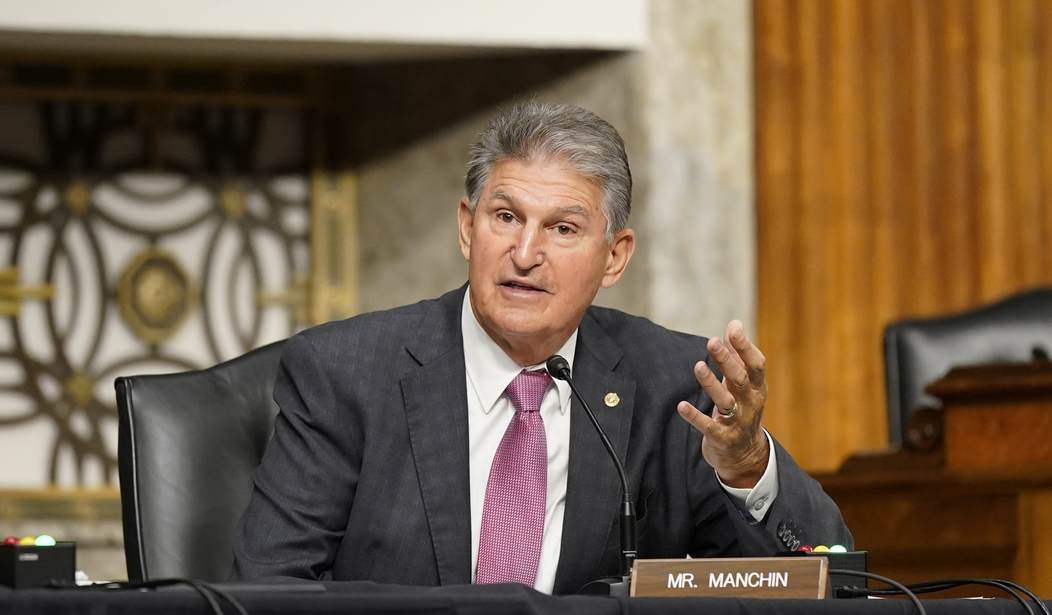What do we even call this bill now? We started with Build Back Better, but it spent months only to never get built into a floor vote at all. A couple of weeks ago, Politico gave us yet another in a series of breathless media reports on the BBB’s supposed resurrection, cleverly calling it Build Back Better Late Than Never. Supposedly the wheels were turning on the reconciliation package again:
Senate Democrats are preparing for possible summer action on their still-elusive climate, tax reform and prescription drugs bill, grinding behind the scenes on a new version during high-profile gun safety talks.
With much of Washington’s attention on guns, Majority Leader Chuck Schumer and Sen. Joe Manchin (D-W.Va.) met twice this week on a potential party-line package. There’s more afoot: Schumer and his staff are working with the Senate parliamentarian to help tee up a possible July or August vote. And a prominent Democratic pollster has tested how popular major components of a hypothetical bill would be in Senate battleground states.
Not so fast, reports the Washington Post today. “Fresh discomfort” has broken out among Senate Democrats, which sounds a lot like the same old discomfort of having to convince Joe Manchin that the best policy on inflation is the hair of the dog. All of the tea leaves from Politico aside, the Post’s sources don’t give any indication that Manchin has moved off of his positions regarding more federal spending in Joe Biden’s inflationary wave:
The chief obstacle remains Sen. Joe Manchin III (D-W.Va.), a moderate whose opposition last year scuttled President Biden’s agenda. Manchin has huddled privately and repeatedly with Senate Majority Leader Charles E. Schumer (D-N.Y.) in recent weeks, as Democrats labor anew to secure his must-have vote on a scaled-back bill that they hope to bring to the floor in July.
Manchin has remained steadfast in his belief that the U.S. government should spend less, and raise more, than others in his party prefer. Increasingly, Democrats believe they will end up with a package far smaller in scope than they first envisioned — one focused on lowering prescription drug prices and combating climate change, with spending financed through changes to tax laws that also cut the deficit.
But many of the key details are still unresolved, generating fresh discomfort among lawmakers. In a sign of the lingering schisms, a broadly supported attempt to lower the price of health insurance by extending subsidies under the Affordable Care Act remains at risk of falling out of the package entirely. The loss of those tax credits could result in premium increases for millions of Americans next year.
The delays and doubts have only compounded Democrats’ frustrations after they had to abandon plans to lessen the price of housing, make child care more affordable and push the development of energy sources that can be alternatives to expensive gas — ideas, they say, that might have made a difference with a potential recession on the horizon.
So what do we call this now? Build Back Busted Too Late to Matter?
Even assuming that Manchin suddenly decided to spend like a drunken sailor — only perhaps a mildly drunken sailor this time around — it would take weeks to structure the package, get a CBO rating on it, and then sell it not just to Senate Democrats but also House Democrats. Granted, the progressives in the lower chamber might be desperate for any kind of W to put on the board, but they spent all of the latter half of 2021 and a good chunk of the first quarter of this year insisting that they wouldn’t accept half a loaf on their progressive agenda. An eighth-loaf is not likely to make them happier, even with time running out.
Speaking of which, Congress doesn’t have much time at all left before the summer vacation that allows incumbents time to campaign back home. The Senate’s out this week and next, returning on July 11th (more likely the 12th) and out again on August 8 for another full month. Next month’s calendar might give them time to move on reconciliation, but it might get tied up with FY2022 budgeting and whatever performative posturing both parties will conduct on abortion in the aftermath of Dobbs. The House has only twelve days of floor time in July, too, although they haven’t listed their schedule for August yet.
They could still pass a reconciliation bill after Labor Day, but at that point it would be moot for the midterms. Nothing in the spending package contemplated by Manchin or Schumer would have an immediate impact on inflation, wage erosion, or for that matter much of anything else either. It would be nothing more than a box-checking exercise for Schumer, and a lame one that progressives would likely criticize than cheer.
Anything could happen in the Manchin-Schumer talks, of course, but nothing’s happened for the last nine months on it so far. Given the disastrous impact that Biden’s big-spending American Rescue Plan has had on the American economy, it seems unlikely that Manchin will see a follow-up massive spending bill as any better idea than it was a few months ago. All of the anonymously sourced stories signaling progress — a cottage industry in itself ever since last fall — appear to be narrative journalism at best, and more likely spin intended to move Manchin off his position. It hasn’t worked so far, and it doesn’t look like it’s working at the moment either.
Either way, Senate Democrats better get prepared for lots more “fresh discomfort” in this midterm cycle.
For those who don’t recognize the cultural reference in the headlines, I … weep for you.








Join the conversation as a VIP Member